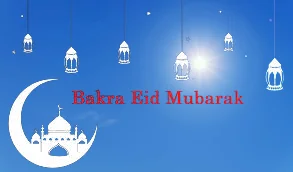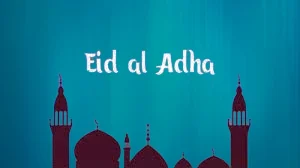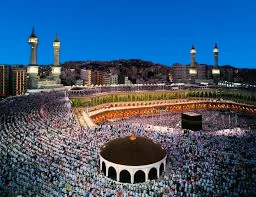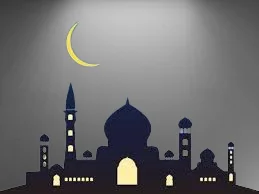Eid al-Adha or also named as Eid ul-Adha is the festival of sacrifice observed by the Muslim communities across the globe. It is one of the two most important holidays celebrated in Islam. Another one is Eid al-Fitr.
Eid al-Adha
Muslims celebrate this festival on the last day of the Hajj. The Hajj is pilgrimage to Makkah in Saudi Arabia. It occurs every year and is the Fifth Pillar of Islam. All Muslims who are fit and able to travel should make the visit to Makkah at least once in their lives. Every year around 2 million Muslims from all over the world visit Makkah.

Millions of Muslims travel to Mecca every year for Hajj, retracing the steps of Ibrahim (AS) as he left his wife, Hajra, and his son, Ismail, in the desert of ancient Mecca by the command of Allah (SWT). The Prophet Muhammad (PBUH) later established Hajj as an annual pilgrimage.
The pilgrimage is regarded as an honour for Muslims, with all those who complete it allowed to adopt the title of Hajji (men) or Hajjah (women) for life. Those who feature such titles in Islamic culture are thought to hold more wisdom, thus earning greater respect from their peers.

During the Hajj the pilgrims perform acts of worship and renew their faith and sense of purpose in the world. They stand before the Ka’bah or Kabaa, a shrine built by Ibrahim, and praise Allah together.
The Ka’bah is the most important monument in Islam. Pilgrims walk around the Ka’bah seven times and many of them try to touch the Black Stone located at the corner.
In the Islamic lunar calendar, Eid al-Adha falls on the tenth day of Dhu al-Hijjah and lasts for four days. In the international (Gregorian) calendar, the dates vary from year to year, shifting approximately 11 days earlier each year.

It is a public holiday in Muslim countries. In 2023, Eid ul-Adha will begin on the evening of Wednesday 28 June and end on the evening of Sunday 2 July.
History
Eid ul-Adha celebrates the time when Ibrahim ( Ibrahim is regarded in Islam as the father of the Arab people. In Ibrahim’s time, people practiced idolatry . Ibrahim refused to worship idols and would only worship one God, Allah. He is known as a hanif, which is a person who lived before Muhammad and who was totally committed to worshipping only one God ) had a dream which he believed was a message from Allah asking him to sacrifice his son Ismail as an act of obedience to God.
As Ibrahim was about to kill his son, Allah stopped him and gave him a lamb to sacrifice instead. That’s why this festival is called as a festival of sacrifice.
Observation

The tradition is that, on this day Muslims will slaughter an animal and share the meat in three equal parts. one part is for family, 2nd part is for friends and relatives and the 3rd part will be distributed among poors.
The sacrificed animal is referred to as Udiyyah (meaning “the sacrificed” in Arabic), and has to meet a certain set of rules, which include being of a certain age and of the highest quality available.
Eid-ul-Adha is known as Bakri Eid in India. is a gazetted holiday in India, and a majority of all national, state and local government workplaces shall remain closed. Devotees offer prayers at the mosque. The prayer is performed any time after the sun completely rises up to just before the entering of Zuhr time, on the tenth of Dhu al-Hijjah.
Salat ul-Eid are significant prayers which take place during the first day of Eid to kick things off.